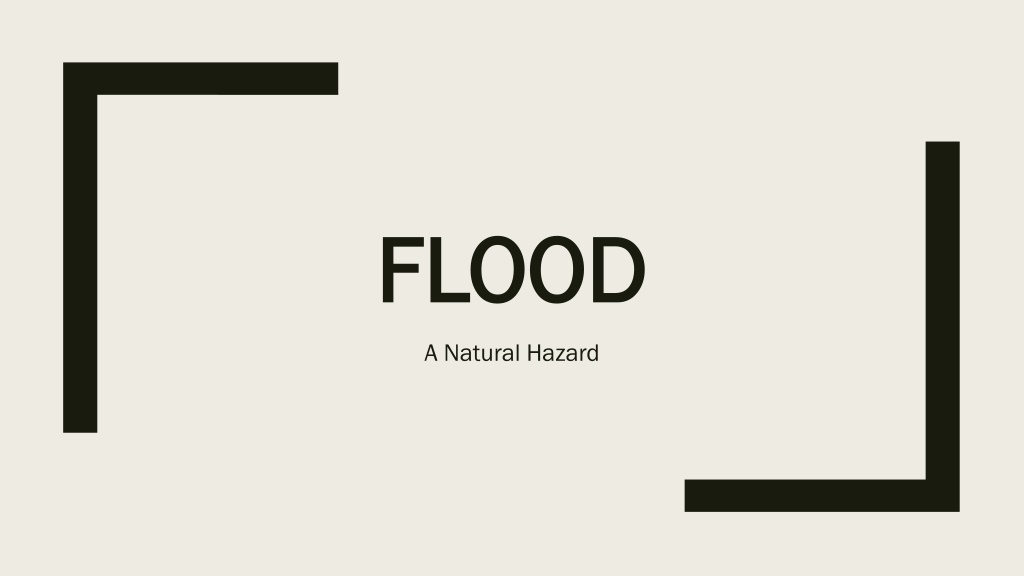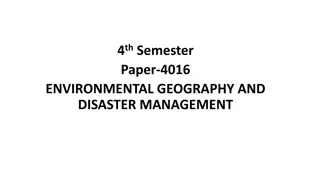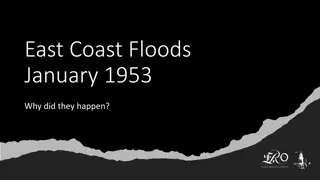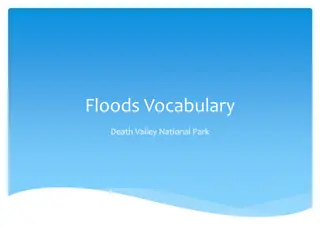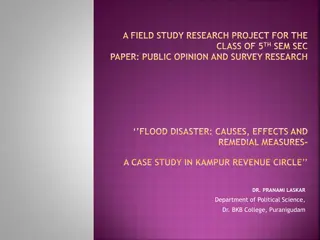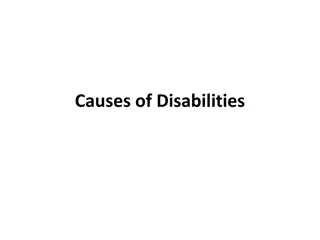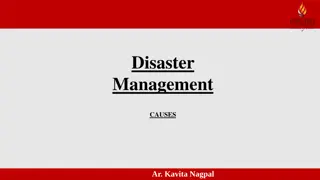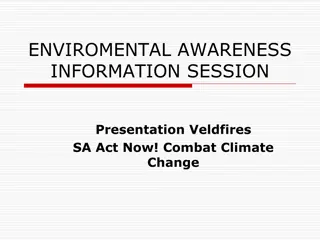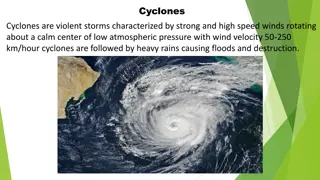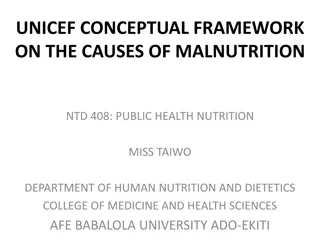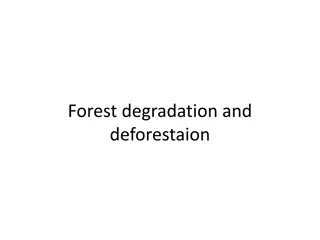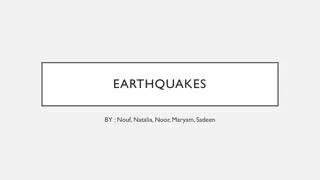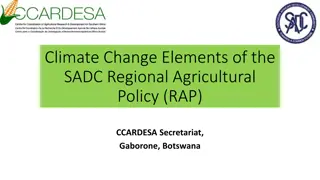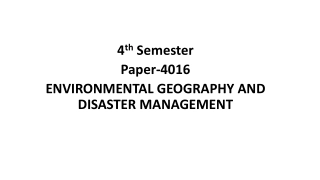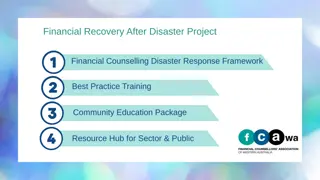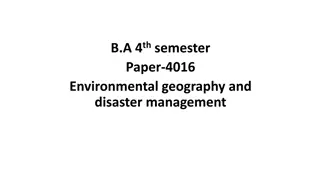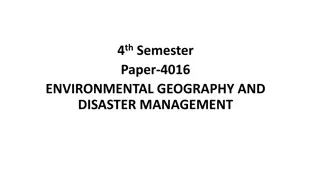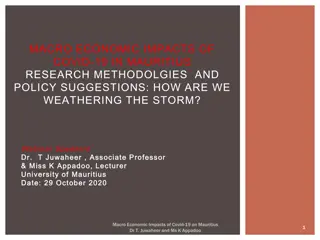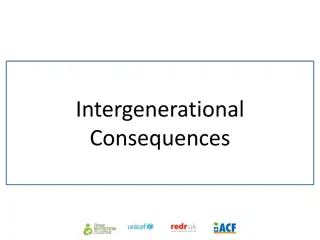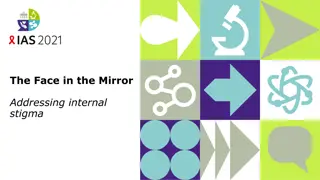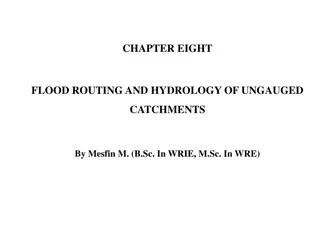Understanding Floods: Types, Causes, and Impacts
Floods are a natural hazard resulting from various factors like heavy rainfall, river bank overflow, or dam failure. They lead to land submergence and occur worldwide, causing significant economic losses. This article explores different types of floods, including precipitation and non-precipitation floods, their sources, and impact on regions like India.
Download Presentation

Please find below an Image/Link to download the presentation.
The content on the website is provided AS IS for your information and personal use only. It may not be sold, licensed, or shared on other websites without obtaining consent from the author. Download presentation by click this link. If you encounter any issues during the download, it is possible that the publisher has removed the file from their server.
E N D
Presentation Transcript
FLOOD FLOOD A Natural Hazard
Flood: Definition Flood is defined as a state of high water level / overflow along a river channel or on coast that leads to submergence of land that is usually dry. It occurs due to overflow or failure of river bank and dams or due to high intensity rainfall. Floods are a natural process, but mankind's activities affect flooding. About one-third of the annual natural disasters and economic losses and more than half of all victims are flood related. It is the most common and damaging/ destructive of all natural disasters worldwide. In India out of the total 329 million hectares of geographical area, 40 million hectares (12 % or 1/8th) of the total land is assessed to be flood prone,
1. Which of the following statement is correct about floods? 1. Which of the following statement is correct about floods? a) Flood is a natural hazard in response to heavy rainfall b) Flood causes overflow along river channel c) It leads to submergence of land d) All of the above 2. Which of the following statement is not correct about floods? 2. Which of the following statement is not correct about floods? a) Flood is the most frequently occurring of all disasters worldwide b) About 50 % of all disaster s victim worldwide are related to flood c) About 12 % of India s geographical area is prone to flood d) Floods occurs only through natural processes
Types of Floods Depending upon the source of water and ground location, floods may be classified as follows: A. A. Precipitation Floods Precipitation Floods I. I. Rainfall Floods Rainfall Floods a) Heavy rainfall floods b) Single event floods (cloud burst) c) Multiple events floods (temporary blocking) d) Flash floods e) Seasonal floods II. Precipitation other than rainfall floods Precipitation other than rainfall floods a) Snow melt b) Ice melt
B. Non B. Non- -Precipitation Floods Precipitation Floods a) Estuaries Floods b) Coastal Floods i. Storm surges due to cyclonic storm ii. Tsunamis due to under ocean earthquakes c) Breach floods due to breaches in canals, river, embankment and levees d) Dam burst floods From the above classification it is clear that floods can be of either: i. Slow developing type by accumulating water and saturating grounds or ii. Sudden onset type by sudden gushing of enormous volume of water beyond normal conveyance capacity of drainage channel.
Q Which of the following is not a type of Precipitation Floods? Q Which of the following is not a type of Precipitation Floods? a) Flash floods b) Estuarine floods c) Seasonal floods d) Snowmelt Q Which of the following is not a type of Non Which of the following is not a type of Non- -Precipitation Floods? a) Storm Surge b) Estuarine floods c) Ice melt d) Tsunamis Q Which of the following is not a natural cause of flood? Which of the following is not a natural cause of flood? a) Heavy rainfall b) Deforestation c) Large catchment area d) Tropical Cyclones Precipitation Floods?
Q Which of the following is not a Meteorological cause of floods? Which of the following is not a Meteorological cause of floods? a) Heavy Rainfall b) Siltation c) Cloud Burst d) Tropical Cyclone Q Which of the following is not an anthropogenic cause of floods? Q Which of the following is not an anthropogenic cause of floods? a) Accelerated urbanization b) Unscientific agricultural practices c) Bursting of dams d) Low elevation of land
Causes of Floods Floods are generally caused by one or more unfavourable meteorological and physical factors. A combination of unfavourable meteorological and physical factors aggravated by human factors working together leads to a serious flood situation. Following are the major causes of floods: A. Meteorological Factors B. Physical Factors C. Human Factors
A. Meteorological Factors Heavy Rainfall Tropical Cyclone Cloud Burst
B. Physical (Topographical) Factors Large Catchment Area Inadequate Natural Drainage Arrangement Low elevation of land
C. Human Factors Deforestation Siltation Unscientific agricultural practices Unscientific irrigation practices Bursting of Dams Accelerated Urbanization
Consequences of Floods Floods have multipronged effects on human life. In fact, floods cause more damage than any other single disaster. The highly destructive characteristic of floods results from the fact that they cover large areas and are recurrent in nature. Floods are becoming more damaging as their frequency, intensity and magnitude increase with passage of time. The consequences of floods are: i. Colossal loss of lives and properties ii. Failure of the city drainage system iii. Collapse of building and other physical structure iv. Landslides in hilly terrain associated with flash flood v. Threat of epidemics and menace to public health
i. Contamination of sources of drinking water ii. Losses of harvests and washing away of flood stocks iii. Loss of life iv. Large number of casualties among domestic animals and wild life. About About 20 20 % % of of the the global global death death caused caused by by floods floods in in the the world world occur occur in in India India. . Positive Effects Positive Effects: There are some positive effects too of floods. Floods renew the soil and enrich their fertility with addition of nutrients.
Q Which of the following statement is correct about the consequences of floods? Which of the following statement is correct about the consequences of floods? a) Colossal loss of lives and properties b) Collapse of building and other physical structure c) Threat of epidemics and menace to public health d) All of the above Q Which of the following statement is correct about the impacts of floods? Which of the following statement is correct about the impacts of floods? a) Landslides in hilly terrain associated with flash flood b) Losses to harvests c) Contamination of sources of drinking water d) All of the above Q Which of the following statement is correct about flood? Which of the following statement is correct about flood? a) It is the least occurring natural disaster worldwide b) Twenty percent of the global death caused by floods in the world occur in India c) It is caused by a combination of meteorological, physical factors and aggravated by human factors d) It is considered as highly destructive natural phenomenon worldwide
